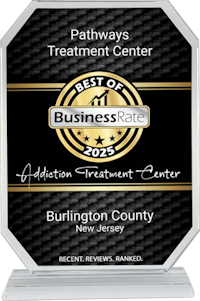Anxiety and Addiction Recovery in Burlington, New Jersey
When anxiety co-occurs with addiction, it can make recovery harder. Our treatment plans help you reduce anxiety and gain healthy coping skills while addressing the root causes of substance use.
As we continue to learn more about the way the body and brain function, both together and on their own, there is an emerging correlation between mental health conditions and substance use disorder. Addiction is frequently the result of an attempt to self-medicate a mental health condition using drugs and/or alcohol. But in some instances, the chemical changes to the brain that often occur as a result of addiction can support the development of a mental health condition.
Known as dual diagnosis treatment, the simultaneous occurrence of a mental health condition and substance abuse issue, such as anxiety and addiction, can be treated when addressed professionally. Since both the addiction and the mental health condition are often intertwined, they have to be addressed and treated simultaneously in order for treatment to be effective. This helps prevent relapse and promotes the development of healthy coping mechanisms that halt development of other addictions and aggravating existing mental illnesses.
Anxiety and Addiction Recovery in Burlington, New Jersey
What is an Anxiety Disorder?
Anxiety disorders are one of the more common mental health conditions not just in the United States but worldwide. While we all experience feelings of stress or anxiety, someone suffering from an anxiety disorder may experience these feelings for prolonged periods of time. There also may seem to be no reason for their feelings of anxiety.
In some extreme cases, an anxiety disorder can prevent a person from being able to make social connections or perform the most basic of functions. While situational anxiety tends to dissipate soon after the anxiety-inducing situation has ceased, those with anxiety disorder may continue to experience the effects of anxiety for weeks, months, or even years if not properly addressed and treated.

Anxiety and Addiction Recovery in Burlington, New Jersey
Types of Anxiety Disorders
Anxiety disorder by itself is an umbrella term. There are several different types of anxiety disorders, each with its own set of symptoms and criteria for diagnosis. The development of an anxiety disorder is highly dependent on a person’s history and existing temperament, as well as if there are any pre-existing mental illnesses
Some examples of anxiety disorders include:
- Generalized Anxiety Disorder (GAD): Generalized Anxiety Disorder is the most common form of anxiety disorder and one of the most recognizable anxiety disorders. GAD is characterized by chronic, exaggerated worry about everyday events, often leading to restlessness, muscle tension, and difficulty concentrating.
- Social Anxiety Disorder (SAD): As the name implies, someone suffering from Social Anxiety Disorder often feels intense anxiety related to any kind of social interaction. This can be true in reference to an actual interaction or even the thought of an interaction. SAD can interfere with their ability to maintain relationships or perform well in social or work settings.
- Panic Disorder: Panic disorder involves sudden and intense panic attacks. These panic attacks may arise without being triggered by anything specific, making them tough to anticipate and deal with. Someone suffering from a panic disorder may experience heart palpitations, sweating, trembling, and an overwhelming sense of impending doom.
- Obsessive-Compulsive Disorder (OCD): OCD involves recurring, unwanted thoughts (obsessions) and repetitive behaviors (compulsions) aimed at reducing anxiety. These behaviors often become time-consuming and interfere with daily life, causing more stress and anxiety.
- Phobias: Phobias are intense, irrational fears of specific objects or situations, such as heights, spiders, or flying. People with phobias often go to great lengths to avoid their triggers, which can impact their quality of life.
- Post-Traumatic Stress Disorder (PTSD): PTSD develops after a person has experienced or witnessed a traumatic event. It is most commonly associated with veterans and first responders. Symptoms can include flashbacks, nightmares, and severe anxiety.
Anxiety and Addiction Recovery in Burlington, New Jersey
How Anxiety and Addiction Can Interact
Mental health conditions and addiction often go hand in hand. While some people who suffer from anxiety disorder seek the help and treatment of a mental health professional such as a psychiatrist or psychologist, others may turn to consuming drugs or alcohol as a way of self-medication. This may be out of fear or embarrassment of their condition, or due to lack of resources available to them to seek proper treatment.
While these substances may initially appear to be helping alleviate symptoms associated with their anxiety disorder, they may foster a dependency on those substances which can ultimately turn into an addiction. This is where alcohol addiction treatment and benzo addiction treatment become essential to address both the addiction and underlying mental health concerns. The temporary relief provided by the substance doesn’t actually resolve the anxiety or serve the person with the disorder in coming up with a proactive solution.
In some instances, a mental health professional may prescribe a benzodiazepine (such as Xanax or Valium) to help treat some of the symptoms associated with anxiety disorder. These drugs are often intended only for short-term use. But many who take these substances for a prolonged period of time find themselves dependent or even addicted to the drug. This is different from “taking the edge off” with a few alcoholic drinks or puffs on a joint, but it is also a very real danger of addictive substances interfering with treating anxiety.
Dual Diagnosis
When someone is suffering from a mental health condition and substance use disorder at the same time, in this case, anxiety and addiction, it is known as a co-occurring disorder. This must be treated at the same time in order to be treated effectively, so that an attempt to speak to one condition does not worsen the other.
Dual diagnosis treatment is designed to help the person understand the underlying causes of their anxiety and subsequent addiction, in order to develop more healthy and sustainable coping mechanisms. This is to ensure they no longer feel the need to turn to drugs or alcohol as a self-medicating tool.
Dual diagnosis treatment often combines individual therapy, medication management, and support groups to address the unique challenges that come with recovery. It is designed to speak to the needs of people who require support but also need to evaluate their relationship to both addiction and their anxiety.
Anxiety and Addiction Recovery in Burlington, New Jersey
Signs of Addiction
In the desire to self-medicate, people with anxiety disorders may not realize it when they’re becoming addicted to the very substances they use to help alleviate their anxiety. If it’s not clear what to look for, it may be difficult to detect addiction and get help for yourself or a loved one who may be struggling.

Some of the common signs and symptoms associated with addiction include:
- Increased Tolerance: When someone becomes dependent on or addicted to a substance, they often find themselves needing more and more of the substance in order to reach their desired effect. This can ultimately lead to a person taking a dangerous amount of a substance and risking an overdose (especially if they do so after a short period of sobriety).
- Loss of Control: Someone suffering from addiction may find themselves having trouble stopping taking the substance, even when they know it is causing harm and is no longer good for them. They may find themselves actively trying to stop using and being unsuccessful, giving in to symptoms of withdrawal or not having any replacement coping mechanisms for their mental illness.
- Experiencing Withdrawal: Someone may find themselves unsuccessful in quitting substance use due to the withdrawal symptoms they experience once they stop. Withdrawal symptoms can be unpleasant or even dangerous when not treated properly. People often find themselves going back to using the substance in order to make them stop.
- Neglecting Responsibilities: Someone may have an unhealthy relationship with drugs or alcohol if their substance use gets in the way of them being able to take care of their daily obligations, such as going to work or school. This also applies to obligations to family members, friends, or religious and social groups.
- Preoccupation with Substance Use: Someone dealing with substance abuse may find themselves constantly thinking about using that substance. They may be thinking about when they are going to take it next or how they are going to get it. They may spend a lot of their time using the substance or spend an inordinate amount of money procuring it.
- Risky Behaviors: Being under the influence of a substance can inhibit judgment, whether an addiction is present or not. But someone suffering from an addiction may be more likely to engage in risky or dangerous behavior since they are more regularly under the influence. They may also be driven to take greater risks as they ingest greater amounts of the substance to achieve a feeling of being high.
Anxiety and Addiction Recovery in Burlington, New Jersey
Receive Dual Diagnosis Treatment for Anxiety and Addiction at Pathways Treatment Center
Anxiety and addiction can create a cycle of addiction that can be challenging to break. For those struggling with both conditions, it’s important to understand that help is available and that recovery is possible with dual diagnosis treatment.
At Pathways Treatment Center, we understand the importance of dual diagnosis treatment for addressing both mental health conditions and addiction simultaneously. That’s why we offer a number of different treatment options to help those in need address a variety of substance abuse and mental health conditions.
We work to help people get their lives back on track and on the road to recovery. If you or a loved one is suffering from anxiety as well as a substance use disorder, contact us today.



